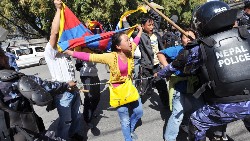Tibetet Segítő Társaság Sambhala Tibet Központ
Tibet Support Association Sambhala Tibet Center
székhely / telephely H-Budapest I. Attila út 123..
(00-36) 70 431 9343 (00-36)70 944 0260 (06-1)782 7721
sambhala@tibet.hu www.tibet.hu tibetpress.info
Facebook/Sambhala Tibet Központ Facebook/Tibett Segítő Társaság
MagnetBank/ 16200010-00110240
IBAN/HU94 16200010 00110240 00000000 SWIFT/HBWEHUHB
(1%) adószám/ 18061347-1-41
nyitva tartás/hétköznap 12.00-20.00 hétvégén előadás függő
» tibeti művészet» lapszemle.hu» thetibetpost.com» eastinfo.hu» rangzen.net» ChoegyalTenzin» tibet.net» phayul.com» DalaiLama.com» vilaghelyzete.blogspot.com» Videók» Linkek» TibetiHírek» Szerkesztőség
Nepal applauds China at UPR for its work in Tibet/ENG
2018. november 9./Phayul.com/TibetPress
eredeti cikk
By Tenzin Sangmo DHARAMSHALA, Nov. 9: Nepal, as a member of UN, lauded China at the 31st Universal Periodic Review held in Geneva on Nov 6.
DHARAMSHALA, Nov. 9: Nepal, as a member of UN, lauded China at the 31st Universal Periodic Review held in Geneva on Nov 6.
Here is the text of the speech made by the Nepal's Representative at the UPR session.
“Thank you, Mr. President. We welcome the delegation of China and appreciate their presentation report.
China has been accelerating comprehensive development creating a robust base for wider realization and promotion of human rights.
Remarkable economic and social development has been achieved in the Tibet Autonomous Region which adjoins Nepal.
Nepal recommends the following:
Continue to implement the Free Education Policy in the TAR
Increases support for early childhood education in the rural communities
Continue to protect the rights of the migrant workers through legislation
We wish China every success in their UPR process.
Thank you, Mr. President.”
While it is definitely disappointing for Tibetans, it didn’t come as a surprise per se. Nepal, since the abolition of its Monarchy in 2008 has been consistently absorbed by China’s power, worsened by the impact of the devastating earthquake in April 2015.
China has always been a big influence. Maoism, a political ideology designed after the teachings of Chinese core leader Mao Zedong or Chairman Mao that took root in the country in mid-1990’s remained underground for many years while carrying out disrupting activities against the elites. It was at peak around 2006-2007 when Nepal was contemplating switching to a constitutional democracy.
In 2006-2007, the Maoist targeted all the Tibetan garment and carpet factory. Tibetan carpets were topping the list of foreign exchange goods. 80-90-% Tibetan owners were forced to close their factories and many moved abroad.
The situation began to deteriorate when the government ordered the closure of the Office of the Dalai Lama in January 2005. The office was symbolic in its recognition of the Dalai Lama as the political and spiritual leader of Tibetan people.
The closures are signs of something bigger, a writing on the wall.
Nepal was not only a host country but because of its geographic location functioned as a transit for Tibetan refugees looking to move to India. Nepal, at the urging of the Chinese government, had mostly slammed the door to Tibetan refugees who flee to freedom through Nepal.
According to International Campaign for Tibet, a nonprofit in DC that closely tracks the situation of Tibetans, the average of 2500-3500 a year declined dramatically to just a couple of hundreds a year since the crackdown on 2008 peaceful protest.
Nepal is not a signatory to UN Refugee Convention. Yet under the Gentleman’s Agreement, it is required to provide safe passage to India for Tibetan refugees, who the UN recognizes as “person of concern.”
Before the surge in control on activities of Tibetan refugees in the last decades, a key issue Tibetan refugees were battling for years was lack of a definitive identity and legal status. Tibetans who reached Nepal before 1989 were deemed eligible for Refugee Certificate but many never got it and those who came after 1989 were denied that right because they are “not real refugees’ after 30 years.
The lack of proper documents limits access, growth, and mobility of the refugee population.
In September 2012, U.S. made a fresh plea to Nepal to provide identification papers to Tibetan refugees living in the country, but the government, which cited “geopolitical sensitivities” in an apparent reference to pressure from China, flatly rejected its request.
Khadga Prasad Oli of Nepal Communist Party is the incumbent prime minister of Nepal since 15 Feb 2018. He is also the eleventh prime minister so far in the government that has written its constitution twice.
In June this year, during his five-day visit to China, Oli signed eight deal worth 2.24 billion USD. Nepal is a member of the China proposed Belt Road Initiative (BRI).
Nepal Deputy Prime Minister Krishna Bahadur said: “Nepal is gradually moving forward from the status of a least-developed country, our economic growth is rising, and is full of possibilities, so with the Chinese assistance, we can attain economic prosperity.”
According to Human Rights Watch, “Nepal signed several security and “intelligence-sharing” agreements with China and implemented close monitoring of the Tibetan community, its leaders, and real or perceived activists.
Tibetan refugees in Nepal weren’t able to observe the Tibetan National Uprising Day, H.H. the Dalai Lama’s birthday, or Conferment of Noble Peace Prize to the Dalai Lama.
"Observations of all anniversaries are thwarted with heavy security deployment and summoning of settlement heads to the police station," said Tenzin Dawa, Researcher at TCHRD.
Professor Robbie Barnett, a Tibetologist and a witness of 1987 protest in Tibet remarked that the all-out protest that took place in Nepal as a part of the widespread protest by Tibetans around the world during the 2008 Beijing Olympic may have set the tone for the precautionary orders from the government of Nepal.
China is coming up with different development projects and trade incentives for Nepal every other week. For now, it seems imminent that the political rights of the Tibetans will only become more restricted in the near future.
